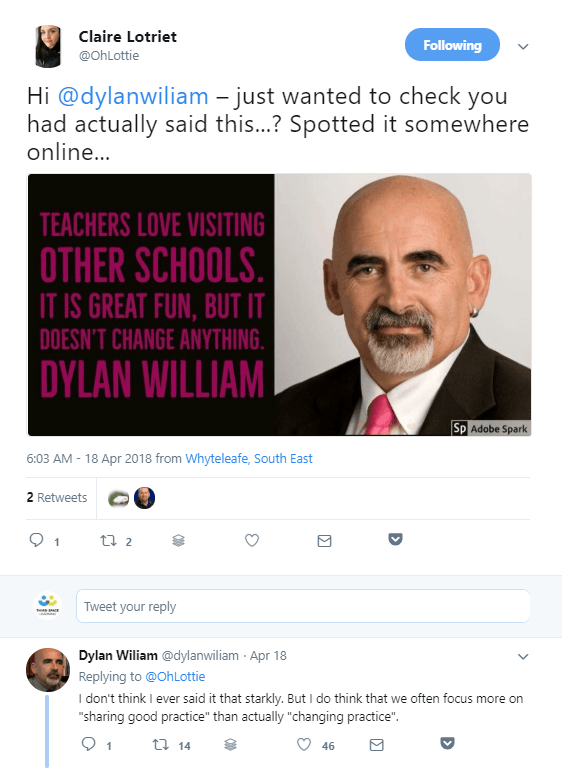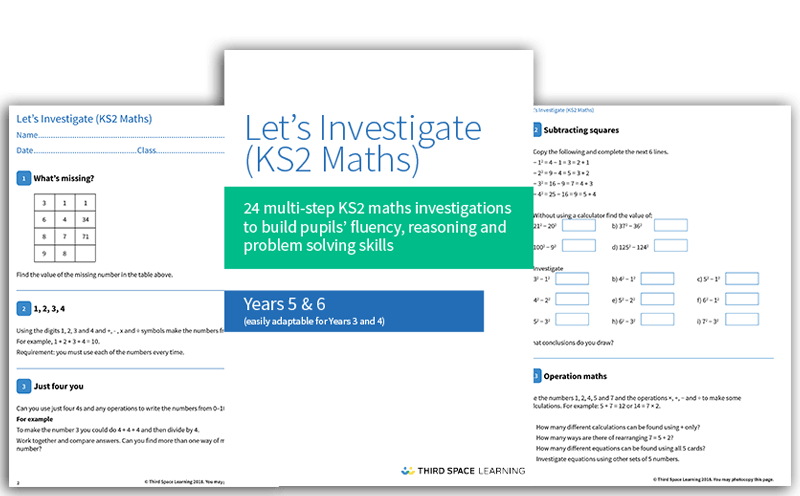The Problem With School Visits [And How to Improve Them]
Why TES author and teacher Clare Lotriet disagrees with a famous Dylan Wiliam “quote” on school visits, and how to supercharge their impact to change and improve primary school practice.
“Teachers love visiting schools. It is great fun, but it doesn’t change anything.”
Dylan Wiliam
I saw this quote posted online a while back and my immediate reaction was to think “did he really say that?”. Mainly because, for once, I completely disagreed and I often find Dylan Wiliam makes a lot of sense to me as a teacher.
After tweeting Dylan Wiliam himself, he clarified his thoughts a bit further: “I don’t think I ever said it that starkly but I do think we often focus more on ‘sharing good practice’ than actually ‘changing practice.’

Whatever he actually said in the first instance, as ever, he’s got a point hasn’t he?
Primary School Visits: The Problem I’ve Faced
When I sat down to think about this a bit more myself, I came to the conclusion that, over my years of teaching, a large proportion of my visits to other schools have indeed been more of a case of sharing rather than changing good practice.
It’s really easy to visit schools, see some good stuff going and then head back to your own school and do very little with it. At best, you might tweak some stuff in your own classroom, but significant whole school change have been, in my experience, much rarer.
However, what caused me to disagree with Dylan Wiliam’s purported statement was that one of my recent visits to another school has had a huge impact on our curriculum – Maths in particular – and is definitely a case of changing practice.
Let's Investigate: KS2 Maths Activities
24 opened-ended investigations similar to NRich to keep your pupils engaged in Maths right until the end of term!
Download Free Now!In fact, I can’t think of another school visit that I’ve been part of that has resulted in such significant change back at my own school.
How to Supercharge Impact from School Visits
I’ve tried to unpick what we did differently that meant this visit was the catalyst for a big change in practice.
1) Clarity of Purpose for our Visit: To Develop a Mastery Approach in Maths
Before the visit, we were absolutely clear about the practice in our school that we wanted to change: we wanted to develop a mastery approach in Maths.
We had tried a couple of ready made Maths schemes and they just weren’t hitting the mark; the order of some didn’t work for us or seem to make sense. The plans of some were so unbelievably detailed and lengthy that writing our own seemed quicker. Ultimately, we still weren’t clear that their approaches were much different from what we were already doing.
We wanted to see a Maths mastery approach in action and the impact of it. So, before you plan a visit, the first thing to do is get really specific about what it is that you want to learn from another school. For example:
• What is their approach to the curriculum or a certain subject?
• How does their assessment system works?
• What is their EYFS classroom environment like?
2) We Chose the School to Visit with Care
Our time is precious, isn’t it? If you are a full time class teacher then you probably want a really good reason to be away from them for a morning or a day or however you long you plan to be there.
Linking back to the first point, seek out a school that is doing good things in the specific area you want to change or improve.
It might sound obvious, but that may or may not mean they are an outstanding school (more on why Ofsted Outstanding might not be all it’s cracked up to be here).
The key thing is whether they can really help you in the specific area you’re looking to change.
Getting recommendations off somebody you trust can be really useful here. The school we visited was outside our but was recommended for their new (ish at the time) approach to Maths mastery by someone who we’d worked with for some time, someone who knew our school, and whose professional opinion we trusted.
3) Two of Us to Share our Impressions of the Maths Lessons
On the visit in question, I went, in my capacity as teaching and learning leader, along with our Maths subject leader. I know this impacts on cover back at school but, again, in my experience, two leaders driving something forward is more effective than one.
We were both so taken with the approach we observed when we visited the school and our enthusiasm sort of bounced off each other and snowballed.
She was able to lead on the change as Maths leader and I was able to provide support and help her plan the next steps forward.
When we got back to school, we both took on the new approach in our classes first, before introducing it to the other staff, and it really helped everyone to see how it looked in different year groups – I was teaching Year 6 and our Maths leader had a Year 2 class. Power in numbers.
4) The Headteacher Took Time to Give Us the Background to their Transformation in Maths
Try to sit down with someone from the school you are visiting before you observe lessons to get a greater understanding of what it is you’re going to see.
This is potentially tricky because we all know everyone is busy, but the fact that the headteacher of the school we visited spent a good hour explaining the approach to us in his office – and how he implemented the change – before we observed the Maths lessons really helped.
We were in the classes looking for the key aspects of the Maths mastery toolkit (variation, practice and clarification and application) and it made more sense – the more knowledge you can go in with beforehand, the more useful the lesson observations will be. Equally, learning about how they made the changes was useful too.
5) We Observed Maths Lessons from Across the School – All Years
Unless the purpose of your visit is very targeted to a phase eg about EYFS provisions, I strongly recommend that you try to get into different year groups.
It was really important to us to see how this Maths approach looked in Year 1 through to Year 6 and we were very grateful to be given the freedom to see several different classes.
Results of Our Visit to Explore Maths Mastery
Since our visit, over the last two years, we have introduced a mastery approach, heavily based on what we saw at that school and at the same time clarified what greater depth looks like in Maths and it has been hugely successful.
The approach is embedded across the school and I’ve never known it to be so coherent. Interestingly, this approach has meant that we also stopped planning daily Maths lessons and instead plan sequences of learning. The emphasis is definitely on resources and models of learnings rather than detailed plans.
In fact, I would say my Maths lessons have never been less planned and yet the understanding of the children in my Maths class has never been better. This approach has made me a better Maths teacher.
Mastery Across the Curriculum
An unexpected off-shoot of all this is that I’ve also gone on to construct a mastery model and worked with other subject leaders to apply it to their subjects. The key aspects – variation, practice and clarification and application – underpin all subjects across the school.
We’ve also identified common themes of work at greater depth, whether it’s computing or RE. All of this from one very successful visit.
So to return to Dylan Wiliam’s original point, most I teachers I know do love a nosey around other school – myself very much included – but just visiting a school to have a little look at what they’re doing won’t necessarily change anything.
Plan out your visit and approach it more consciously however and you’ll get an entirely worthwhile experience which can have long lasting positive change back at your own school.
_____
Enjoyed this? Check out two of our most popular reads: The Secret to Primary School Leadership: Keeping It Simple! and The Most Recommended Teaching Blogs For Teachers and School Leaders.
Interested in getting more out of visiting other schools? Share and shape best practice, make great networking connections, and see what truly excellent Maths intervention looks like at these Maths showcases around the country.
DO YOU HAVE STUDENTS WHO NEED MORE SUPPORT IN MATHS?
Every week Third Space Learning’s maths specialist tutors support thousands of students across hundreds of schools with weekly maths intervention programmes designed to plug gaps and boost progress.
Since 2013 these personalised one to one lessons have helped over 150,000 primary and secondary students become more confident, able mathematicians.
Learn about our experience with schools or request a personalised quote for your school to speak to us about your school’s needs and how we can help.





